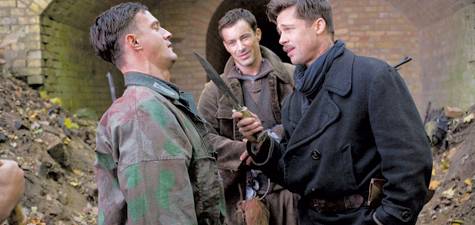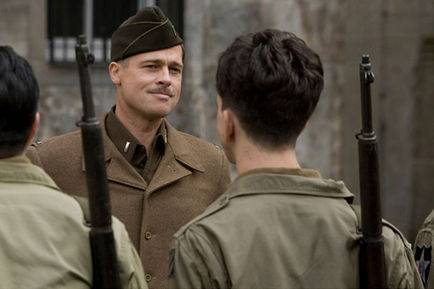
The cinema of Quentin Tarantino has always been derivative in nature. A self-proclaimed movie geek who taught himself film history by working in a California video store, the director’s movies are allusion-packed affairs that riff on his favorite genres as he puts his distinctive spin on them. The quandary of his films is that they’re immature in nature yet often brilliant in execution, making for a seductive combination that’s enamored film-goers and critics alike. Without question, Pulp Fiction was a revelation, a brilliant, brutal revitalization of the crime genre, while Jackie Brown proved to be his most mature, and in many ways, most satisfying film as it not only provided an engaging pulp tale, but a satisfying love story as well.
His latest, Inglorious Basterds certainly isn’t as good as those two features but neither is it as bad as the wildly erratic Kill Bill or tedious Death Proof section of Grindhouse. Tarantino’s take on The Dirty Dozen, at times approaches brilliance in its deliberate pacing and masterful visual composition. Too bad it’s undercut at times by sophomoric humor and violence as well as a nonsensical revisionist take on World War II. More than anything, the film comes off as an adolescent boy’s fever dream in which a backyard game of war is given a multi-million dollar Technicolor treatment. If the damn thing weren’t so entertaining, it would be easy to dismiss completely.

Lt. Aldo Raine (Brad Pitt) is the leader of the title group, a small band of renegades who have been given carte blanche to kill as many Nazis as possible and collect their scalps along the way. Their purpose is to inflict as much mayhem as possible, building a reputation that will instill fear in Hitler’s rank and file. They succeed beyond expectations, leaving scalped bodies in their wake, as well as the occasional one with its brains bashed in. The group is eventually assigned to help blow up a Paris movie theater that will be hosting the premiere of a powerful piece of Nazi propaganda, where Hitler and the other leaders of the Third Reich will be in attendance.
The plot is relatively simple but along the way Tarantino injects film references by the dozen as the movie ends up being a primer on the early German cinema as well as a tribute to the power of the medium itself. The movie in question, Pride of a Nation, a biography of a Nazi war hero is a shameless piece of manipulation that twists history, molds opinion and heightens personal and patriotic emotions. The characters in the film love movies as much as Tarantino does and it proves to be a deadly obsession in the end as its allure proves fatal.
Pitt is quite good here, having fun as the redneck officer who’s as deep as a teaspoon. Relishing the broadness of his character and the outlandishness of the film’s premise, the actor is a garish delight. His opposite, Christoph Waltz as Nazi Col. Hans Landa, is a complex creation, a charming killer who’s constantly three steps ahead of his enemies. A master with words, the actor is given many opportunities to dominate the film, verbally analyzing the whys and wherefores of his and his prey’s intentions before viciously pouncing. The tension between these two is the best thing in the film, providing an anchor for Tarantino’s indulgences.

Basterds is a polarizing affair as it panders to fans of gratuitous violence, provides fun to those who like their comedy dark, appeals to those who appreciate the craft of cinema yet will insult students off history in its disregard for one of the great tragedies of the 20th century. Those who will embrace the film will be justified while those who vilify it will be on equal footing. One suspects Tarantino wouldn’t have it any other way.








